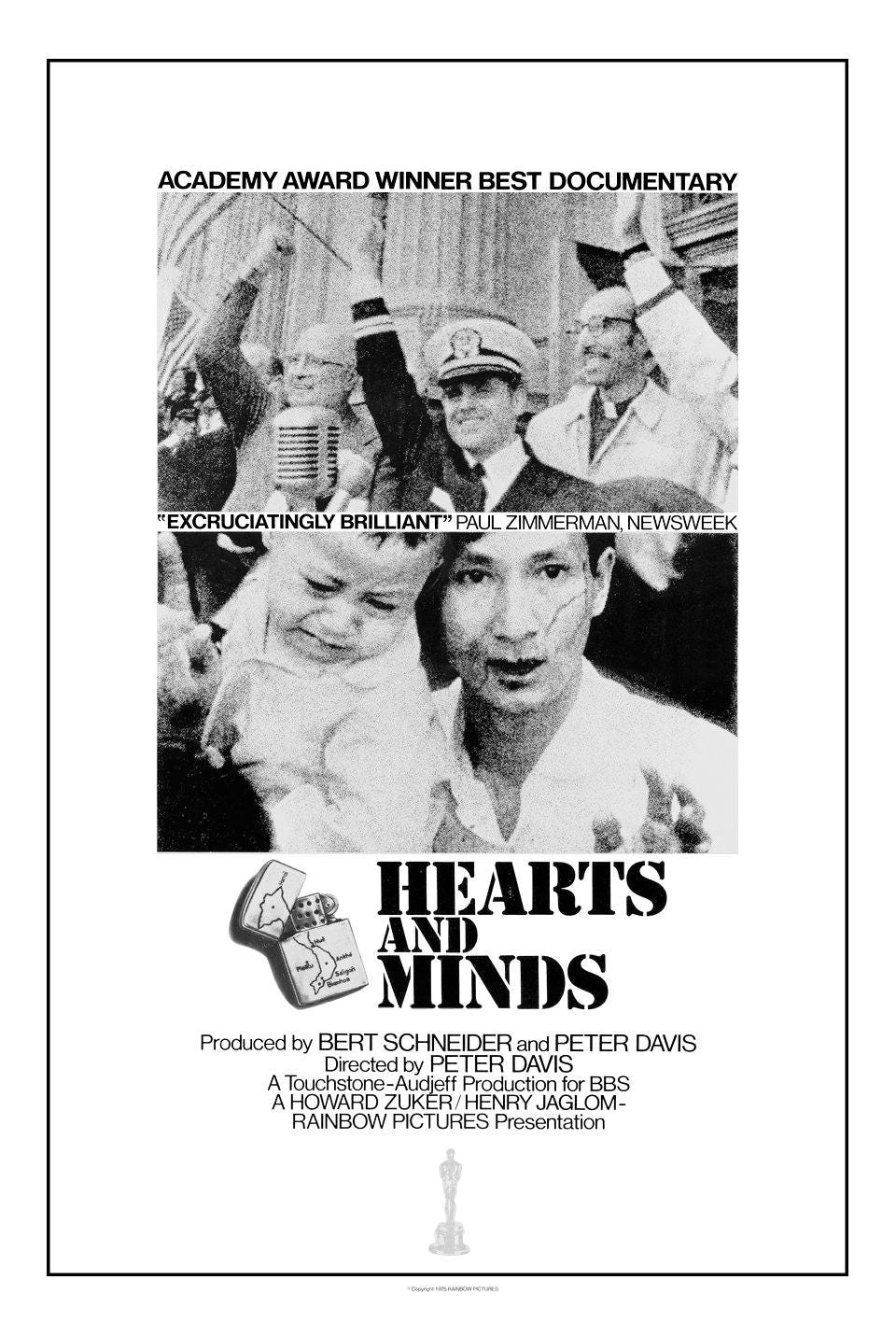Reader, this is a special weekend, because tomorrow marks the four-year anniversary of this newsletter! I launched Dust On The VCR in March of 2021—in the middle of the COVID-19 pandemic and a month before a surprise heart surgery—and it’s kept me busy and happy ever since. But the past year was our best yet—by far. In fact, we’ve more than doubled our subscriber base since last February, which I did not anticipate but am very thankful for. Whether you got in on the ground floor or you’re new around here, thank you for reading. It means a lot to me and all of our guest writers. Now, without further ado, let’s get to today’s feature.
Last year, I started a new tradition here at Dust On The VCR: “fixing” the Oscars by traveling back in time 50 years and changing the numbers to amend just one result in hopes of altering the industry for the better.
The first installment was a bit of a softball—I vastly improved the 46th Academy Awards simply by taking Best Picture away from The Sting and giving it to The Exorcist. I believe this result would’ve paved the way for a more genre-friendly Academy that’s willing to adequately recognize horror, sci-fi, action, thrillers, and other underrepresented flavors of cinema. One year later, we’ve got an Oscars slate that includes a historically high number of nominations for horror films.1 Did my newsletter inspire voters to expand their horizons by changing their hearts and minds? Who’s to say?
Speaking of hearts and minds, my ploy to fix the 47th Academy Awards wasn’t quite as simple. But I believe Hollywood could’ve improved its awards season process by nominating Hearts and Minds, a film believed by many to be the essential Vietnam War documentary, for Best Picture.2
I should begin by acknowledging that the Academy—which often makes mind-boggling decisions when it comes to their awards voting—did a largely great job for the films of 1974. It’s hard to argue with The Godfather Part II winning Best Picture and five other Oscars. And there were plenty of other deserving winners like Ellen Burstyn for her performance in Alice Doesn’t Live Here Anymore, Robert Towne for his Chinatown screenplay, and innovative animator Will Vinton for his short film Closed Mondays.
In fact, the Best Picture field that year was pretty stellar. The Godfather Part II, The Conversation, and Chinatown have only grown in estimation over the past half century, and Lenny is a well-regarded piece in Bob Fosse’s brief but noteworthy directing career. The Towering Inferno is the clear outlier; I don’t think anyone would’ve been up in arms if it was removed from that slot.3
And if we could replace that Best Picture nomination with one for Hearts and Minds? Well, you’d have two pretty interesting residual effects.
The first is kinda obvious but nonetheless egregious: A documentary has never been nominated for Best Picture or Best Director. And yet documentaries have broken through in other categories. Five years ago, Honeyland was also nominated for Best International Feature. Three years ago, Flee was nominated for Best International Feature and Best Animated Feature. And then there’s the head-scratching case of Hoop Dreams, which was nominated for Best Film Editing but not Best Documentary despite producer Ira Deutchman advocating for a Best Picture nomination.4
Even in 1974, it wouldn’t have been unimaginable. Woodstock (1970) was nominated for Best Film Editing as well as Best Sound. The Quiet One (1948) was nominated for Best Original Screenplay. (That’s right; documentaries have writers, folks!) And if you go all the way back to the 3rd Academy Awards, With Byrd at the South Pole (1930) actually won for Best Cinematography.
I do think we’ll see it happen eventually. This “new Academy” has shown signs of thinking outside of the standard Oscars box. And frankly, documentaries are more popular than ever because they’re more accessible than ever. Who would be up in arms if a doc snuck into the Best Picture race every handful of years?5
As for the second ripple effect that a Hearts and Minds Best Picture nomination would’ve caused, perhaps you already guessed where I’m going: politics, baby!
It’s fair to think that timing had a lot to do with Hearts and Minds winning that night, given that the Oscars are often very topical. The film was released less than two years after the Paris Peace Accords were signed and the U.S. withdrew from Vietnam, so the impact of the war was still resonating here at home. And considering the quote from President Lyndon B. Johnson that inspired its title—“The ultimate victory will depend on the hearts and minds of the people who actually live out there”—the film has a degree of finality that might’ve felt sudden at the time.
As these things often do, Hearts and Minds caused some controversy. One interview subject obtained a temporary restraining order after believing that his footage was used in a “somewhat misleading” manner. And Columbia Pictures, the original distributor, refused to release the film. The producers wound up purchasing the rights to the film and distributing it themselves.
But the controversy didn’t stop there. On Oscars night, when Hearts and Minds was crowned the Best Documentary winner, producer Bert Schneider read a telegram from a Viet Cong ambassador thanking the anti-war movement “for all they have done on behalf of peace.” This speech sure didn’t sit well with Bob Hope and Frank Sinatra, two of the ceremony’s four co-hosts that evening. They responded later in the show that “The Academy is…not responsible for any political references made on the program” and that they’re “sorry they had to take place this evening.” In response to that response, fellow co-host Shirley MacLaine proclaimed “I’m a member of the Academy, and you didn’t ask me!” Even Warren Beatty sarcastically quipped “Thank you, Frank, you old Republican.”
I think it’s kinda absurd for the Academy to attempt to publicly distance themselves from “political references,” even in the 70s. Filmmaking—all art, really—is and always has been a political act whether the artist realizes it or not. From casting decisions in pre-production to choices made in the editing room, creators are making some kind of political statement; in fact, the creators that attempt to avoid making political statements often wind up unintentionally making the worst ones.
Sure, it would’ve been funny to have a pissed-off Hope and Sinatra acknowledge Hearts and Minds once again leading up to the Best Picture decision, even though it wouldn’t have stood a chance. But it would’ve been more important as a door-kicking moment inviting future filmmakers to be more open about the political implications of their work.
In some ways, we’re already there. This year’s nominated films all have something to say—whether that message gets across successfully or not. Then again, it sure wouldn’t hurt to see a great documentary making cultural waves by earning the medium’s first ever Best Picture nomination.
Hearts and Minds is now streaming on Max and the Criterion Channel, and it is available for purchase elsewhere.
There were 10 horror nominations this year! Five for The Substance, four for Nosferatu, and one for Alien: Romulus. And you could add six more to the list if you bring sci-fi into the fold (five for Dune: Part Two and one for Kingdom of the Planet of the Apes).
Speaking of essential Vietnam War films, I would highly recommend The Ringer’s Do We Get to Win This Time?, their eight-part podcast series from two summers ago. Brian Raftery does a great job of unpacking the major titles and highlighting many of the lesser-known films.
Am I actively contradicting the call for more genre film recognition from my piece on The Exorcist by removing an action thriller from the 1974 Best Picture race? As Walt Whitman said, I contain multitudes.
Hoop Dreams didn’t bring home any Oscars glory, but the outcry after its lack of recognition did lead to improvements to the Academy’s system, which was pretty wild at the time. Steve Pond’s piece for The Wrap does a great job of summarizing what went down.
Did you know that documentaries are called “docos” in Australia? This has nothing to do with the Academy Awards, but I think it’s neat.






Australia does a lot of neat things.
Oh wow I really hope I see a documentary nominated for Best Picture in my lifetime! (Or, I guess I have now, since this newsletter went back in time and fixed things lol) Happy four-year anniversary to Dust on the VCR!